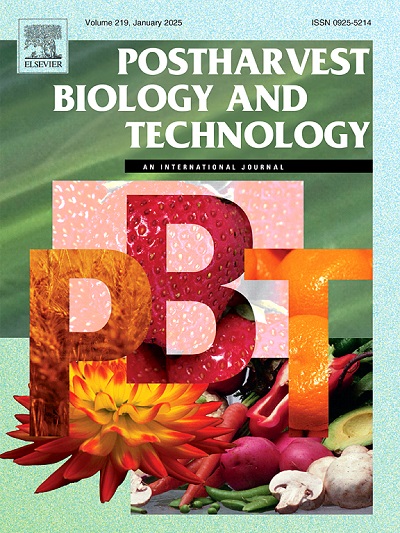亏缺灌溉对番茄采后贮藏性影响的多变量分析
IF 6.8
1区 农林科学
Q1 AGRONOMY
引用次数: 0
摘要
本研究考察了正常灌溉、轻度亏缺灌溉和中度亏缺灌溉三种灌溉制度下番茄贮藏期间的品质变化。结果表明,亏缺灌溉能使番茄在贮藏前后保持较高的可溶性糖含量和硬度,但也会加速品质下降。亏缺灌溉通过调节细胞壁修饰相关基因(如聚半乳糖醛酸酶、果胶酶 8 等)、植物激素(如 1- 氨基环丙烷-1-羧酸氧化酶、脱落酸 8′-羟化酶 1 等)和糖代谢途径(如丙酮酸激酶 1、己糖激酶等)的表达,影响番茄的品质变化。此外,亏缺灌溉也会影响番茄贮藏过程中脂质、脂质分子、有机酸及其衍生物等代谢物的丰度变化。本研究从生理和分子角度阐明了不同程度的亏缺灌溉对番茄贮藏耐受性的调节和控制。本文章由计算机程序翻译,如有差异,请以英文原文为准。
Multivariate analysis of the effect of deficit irrigation on postharvest storability of tomato
This study examined the changes in tomato quality during storage under three irrigation regimes: normal irrigation, mild deficit irrigation, and moderate deficit irrigation. Results indicated that deficit irrigation could maintain high levels of soluble sugar content and firmness in tomatoes both before and after storage, although it also accelerated quality degradation. Deficit irrigation influences the quality changes of tomatoes by regulating the expression of genes related to cell wall modifications (such as Polygalacturonase, Pectate lyase 8, etc.), plant hormones (such as 1-aminocyclopropane-1-carboxylate oxidase, abscisic acid 8′-hydroxylase 1, etc.), and sugar metabolism pathways (such as pyruvate kinase 1, hexokinase, etc.). Additionally, deficit irrigation also affects the abundance changes of metabolites such as lipids, lipid molecules, organic acids, and their derivatives during tomato storage. This study elucidates the regulation and control of tomato storage tolerance by different levels of deficit irrigation from physiological and molecular perspectives.
求助全文
通过发布文献求助,成功后即可免费获取论文全文。
去求助
来源期刊

Postharvest Biology and Technology
农林科学-农艺学
CiteScore
12.00
自引率
11.40%
发文量
309
审稿时长
38 days
期刊介绍:
The journal is devoted exclusively to the publication of original papers, review articles and frontiers articles on biological and technological postharvest research. This includes the areas of postharvest storage, treatments and underpinning mechanisms, quality evaluation, packaging, handling and distribution of fresh horticultural crops including fruit, vegetables, flowers and nuts, but excluding grains, seeds and forages.
Papers reporting novel insights from fundamental and interdisciplinary research will be particularly encouraged. These disciplines include systems biology, bioinformatics, entomology, plant physiology, plant pathology, (bio)chemistry, engineering, modelling, and technologies for nondestructive testing.
Manuscripts on fresh food crops that will be further processed after postharvest storage, or on food processes beyond refrigeration, packaging and minimal processing will not be considered.
 求助内容:
求助内容: 应助结果提醒方式:
应助结果提醒方式:


